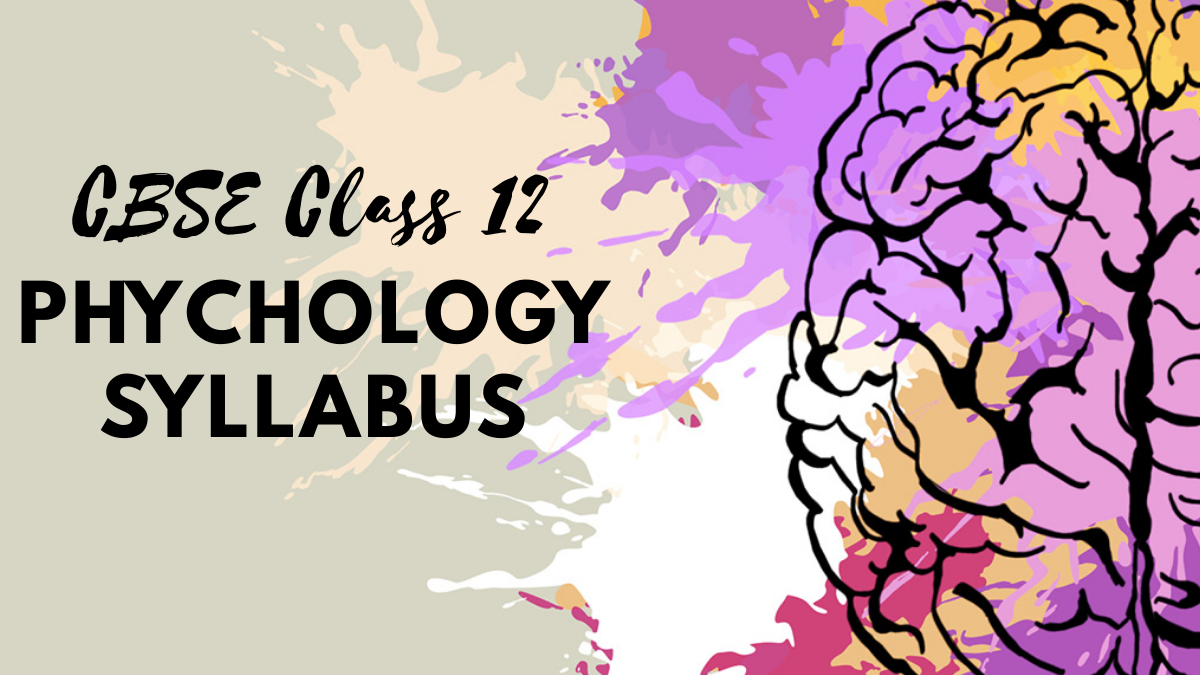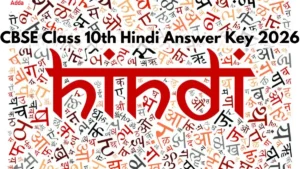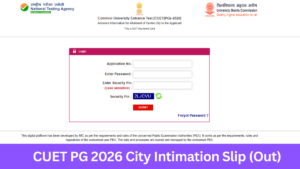Psychology is one of the most popular subjects that is widely chosen by students from an Arts/humanities background. At the start of the academic year 2025-26, the board has released the CBSE Class 12th Psychology syllabus 2025-26 along with all other subjects in pdf format. The updated CBSE Class 12 Psychology Syllabus provides a comprehensive guide to the huge landscape of human behaviour, emotions, and cognition. Download the official CBSE Class 12 Psychology Syllabus PDF using the direct link shared on this page.
CBSE Class 12 Psychology Syllabus 2025-26
The Class 12th Psychology exam consists of 70 marks for theory and 30 points for practical. The CBSE Class 12 Psychology syllabus for theory and practical exams delves into the human psyche, including emotions, behaviours, and therapies. For your exam preparation, you can study the detailed curriculum in a unit-wise breakdown, which is published in the PDF on this page.
CBSE Class 12 Psychology Chapter-wise Marks Distribution
The Psychology Class 12 Syllabus CBSE 2025-26 includes a total of seven units/chapters. 70 marks cover a variety of topics from the CBSE Class 12 Psychology Syllabus, which is organised into seven sections in the following way
| Units | Topics | Marks |
| I | Variations in Psychological Attributes | 13 |
| II | Self and Personality | 13 |
| III | Meeting Life Challenges | 9 |
| IV | Psychological Disorders | 12 |
| V | Therapeutic Approaches | 9 |
| VI | Attitude and Social Cognition | 8 |
| VII | Social Influence and Group Processes | 6 |
| Total | 70 |
Unit Wise Psychology Class 12 Syllabus CBSE 2025-26
In the CBSE 12th Psychology Syllabus 2025-26, Units 1 and 2 of 12th Psychology have the highest weightage of 13 marks each. The factual and application-based questions will be given the highest weightage, approximately 45%.
Unit I Variations in Psychological Attributes
The topics in this unit are:
1. Introduction
2. Individual Differences in Human Functioning
3. Assessment of Psychological Attributes
4. Intelligence
5. Psychometric Theories of Intelligence, Information Processing Theory: Planning, Attention-arousal and Simultaneous successive Model of Intelligence, Triarchic Theory of Intelligence; Theory of Multiple Intelligences.
6. Individual Differences in Intelligence
7. Culture and Intelligence
8. Emotional Intelligence
9. Special Abilities: Aptitude: Nature and Measurement
10.Creativity
Unit II Self and Personality
The topics in this unit are:
1. Introduction
2. Self and Personality
3. Concept of Self
4. Cognitive and Behavioural aspects of Self
5. Culture and Self
6. Concept of Personality
7. Major Approaches to the Study of Personality
● Type Approaches
● Trait Approaches
● Psychodynamic Approach and Post Freudian Approaches
● Behavioural Approach
● Cultural Approach
● Humanistic Approach
8. Assessment of Personality
● Self-report Measures
● Projective Techniques
● Behavioural Analysis
Unit III Meeting Life Challenges
The topics in this unit are:
1. Introduction
2. Nature, Types and Sources of Stress
3. Effects of Stress on Psychological Functioning and Health
● Stress and Health
● General Adaptation Syndrome
● Stress and Immune System
● Lifestyle
4. Coping with Stress
● Stress Management Techniques
5. Promoting Positive Health and Well-being
● Life Skills
● Positive Health
Unit IV Psychological Disorders
The topics in this unit are:
1. Introduction
2. Concepts of Abnormality and Psychological Disorders
● Historical Background
3. Classification of Psychological Disorders
4. Factors Underlying Abnormal Behaviour
5. Major Psychological Disorders
● Anxiety Disorders
● Obsessive-Compulsive and Related Disorders
● Trauma-and Stressor-Related Disorders
● Somatic Symptom and Related Disorders
● Dissociative Disorders
● Depressive Disorder
● Bipolar and Related Disorders
● Schizophrenia Spectrum and Other Psychotic Disorders
● Neurodevelopmental Disorders
● Disruptive, Impulse-Control and Conduct Disorders
● Feeding and Eating Disorders
● Substance Related and Addictive Disorders
Unit V Therapeutic Approaches
The topics in this unit are:
1. Nature and Process of psychotherapy
● Therapeutic relationship
2. Types of Therapies
● Behaviour Therapy
● Cognitive Therapy
● Humanistic-Existential Therapy
● Alternative Therapies
● Factors contributing to healing in Psychotherapy
● Ethics in Psychotherapy
3. Rehabilitation of the Mentally Ill
Unit VI Attitude and Social Cognition
The topics in this unit are:
1. Introduction
2. Explaining Social Behaviour
3. Nature and Components of Attitudes
4. Attitude Formation and Change
● Attitude Formation
● Attitude Change
● Attitude-Behaviour Relationship
5. Prejudice and Discrimination
6. Strategies for Handling Prejudice
Unit VII: Social Influence and Group Processes
The topics in this unit are:
1. Introduction
2. Nature and Formation of Groups
3. Type of Groups
4. Influence of Group on Individual Behaviour
● Social Loafing
● Group Polarisation
Class 12 Psychology Practical Exam Syllabus
The practical exam of the class 12th psychology exam is worth 30 points. It consists of the following: project work, practical file, viva voce, and practical examination.
A. Development of case profile: Using appropriate methods like interview, observation & psychological tests.
B. Test administration: Students are required to administer and interpret five psychological tests related to various psychological attributes like intelligence, aptitude, attitude, personality, etc.
C. In the Practical examination, the student will be required to administer and interpret two psychological tests.
Take a look at the Distribution of Marks:
| Topics | Marks |
| ● Practical File and Case Profile | 10 Marks |
| ● Viva Voce (Case Profile & Two psychological tests) | 05 Marks |
| ● Two tests (5 marks for conducting the tests and 10 marks for reporting) | 15 Marks |
| Total | 30 Marks |
Class 12 Psychology Question Paper design
The theory paper for the 12th-grade psychology exam is held for three hours, during which students need to answer all the compulsory questions in the examination hall. Take a look at the Class 12 Psychology question paper design in the table below
| Time: 3 Hours Maximum Marks: 70 | |||
| S. No. |
Competencies | Total Marks |
% Weightage
|
| 1 | Remembering and Understanding: Exhibiting memory of previously learned material by recalling facts, terms, basic concepts, and answers; Demonstrating understanding of facts and ideas by organizing, comparing, translating, interpreting, giving descriptions and stating main ideas | 35 | 50% |
| 2 | Applying: Solving problems to new situations by applying acquired knowledge, facts, techniques and rules in a different way | 25 | 35% |
| 3 | Formulating, Analysing, Evaluating and Creating: Examining and breaking information into parts by identifying motives or causes; Making inferences and finding evidence to support generalizations; Presenting and defending opinions by making judgments about information, validity of ideas, or quality of work based on a set of criteria; Compiling information together in a different way by combining elements in a new pattern or proposing alternative solutions |
10 | 15% |
| Total | 70 | 100% | |
CBSE Class 12 Psychology Syllabus PDF
Download the CBSE Class 12 Psychology Syllabus PDF and study in line with it. This undoubtedly broadens students’ perspectives and fosters a deeper grasp of the human psyche.
Download CBSE Class 12 Psychology Syllabus 2025-26 PDF
Class 12 Psychology Prescribed Books
Here is the list of the best reference books that give you a clear picture of the CBSE Class 12 Psychology Syllabus
1. Psychology, Class XI, Published by NCERT
2. Psychology, Class XII, Published by NCERT
Note: The above textbooks are also available in Hindi medium










 CBSE Class 10 Hindi Answer Key 2026 PDF ...
CBSE Class 10 Hindi Answer Key 2026 PDF ...
 CUET PG City Intimation Slip 2026 (Out),...
CUET PG City Intimation Slip 2026 (Out),...
 CUET PG Admit Card 2026 (Out Soon), Down...
CUET PG Admit Card 2026 (Out Soon), Down...













